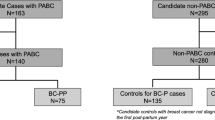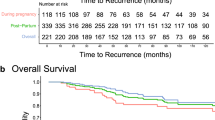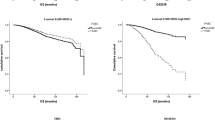Abstract
Background
Breast cancers (BCs) diagnosed after a recent pregnancy display features associated with poor prognosis, including hormone receptor negativity, but other tumor markers have not been examined. We sought to define the tumor marker profile of these cancers, including HER-2 and p53 expression, and examine the time interval over which this adverse profile is observed, relative to last pregnancy.
Methods
A prospectively maintained database was reviewed to identify women with a BC diagnosis between 1998 to 2011. Parous women were categorized on the basis of the interval between pregnancy and BC diagnosis; 0–2 years, >2–5 years, >5–10 years, and >10–15 years. Tumor characteristics of parous cases were compared to those of nulliparous BC patients, who were frequency matched by age.
Results
A total of 175 parous and 114 nulliparous women were identified. Women who were 0–2 years from last parity at the time of BC diagnosis were the only group who were more likely than control women to have grade 3 tumors (P < 0.01), positive lymph nodes (P = 0.02), and triple negative tumors (P = 0.01, odds ratio 3.2, 95% confidence interval 1.2–8.5). There was no difference noted in HER-2 or p53 status relative to interval from pregnancy.
Conclusions
BC diagnosed within 2 years of pregnancy is more likely to have poor prognostic features and to be triple negative. More work is needed to delineate the time frame of pregnancy-associated BC and to define them on a molecular level, so as to devise better prevention and therapy for this devastating problem.
Similar content being viewed by others
References
National Cancer Institute. Breast cancer treatment and pregnancy. http://www.cancer.gov/.
Altekruse SF, Kosary CL, Drapcho M, et al. SEER cancer statistics review, 1975–2007. Bethesda, MD: National Cancer Institute, 2010. http://seer.cancer.gov/csr/1975_2007/. Based on November 2009 SEER data submission, posted to the SEER Web site 2010.
Lyons TR, Schedin PJ, Borges VF. Pregnancy and breast cancer: when they collide. J Mammary Gland Biol Neoplasia. 2009;14:87–98.
Albrektsen G, Heuch I, Hansen S, Dvale G. Breast cancer risk by age at birth, time since birth and time intervals between births: exploring interaction effects. Br J Cancer. 2005;92:167–75.
Albrektsen G, Heuch I, Kvale G. The short-term and long-term effect of a pregnancy on breast cancer risk: a prospective study of 802 457 parous Norwegian women. Br J Cancer. 1995;72:480–4.
Peterson NB, Huang Y, Newcomb PA, et al. Childbearing recency and modifiers of premenopausal breast cancer risk. Cancer Epidemiol Biomarkers Prev. 2008;17:3284–7.
Bruzzi P, Negri E, Vecchia CL, et al. Short term increase in risk of breast cancer after full term pregnancy. BMJ. 1988;297:1096–8.
Lambe M, Hsieh CC, Trichopoulos D, Ekmon A, Pavia M, Adami HO. Transient increase in the risk of breast cancer after giving birth. N Engl J Med. 1994;331:5–9.
Liu Q, Wuu J, Lambe M, Hsieh SF, Ekbom A, Hsieh CC. Transient increase in breast cancer risk after giving birth: postpartum period with the highest risk (Sweden). Cancer Causes Control. 2002;13:299–305.
Wohlfahrt J, Andersen PK, Mouridsen HT, Melbye M. Risk of late-stage breast cancer after a childbirth. Am J Epidemiol. 2001;153:1079–84.
National Cancer Institute. Summary report: Early Reproductive Events and Breast Cancer Workshop. http://www.cancer.gov/.
Daling JR, Malone KE, Doody DR, Anderson BO, Porter PL. The relation of reproductive factors to mortality from breast cancer. Cancer Epidemiol Biomarkers Prev. 2002;11:235–41.
Olson SH, Zauber AG, Tang J, Harlap S. Relation of time since last birth and parity to survival of young women with breast cancer. Epidemiology. 1998;9:669–71.
Bonnier P, Romain S, Dilhuydy JM, et al. Influence of pregnancy on the outcome of breast cancer: a case-control study. Int J Cancer. 1997;72:720–7.
Phillips KA, Milne RL, Friedlander ML, et al. Prognosis of premenopausal breast cancer and childbirth prior to diagnosis. J Clin Oncol. 2004;22:699–705.
Largent JA, Ziogas A, Anton-Culver H. Effect of reproductive factors on stage, grade and hormone receptor status in early-onset breast cancer. Breast Cancer Res. 2005;7:R541–54.
Dodds L, Fell DB, Joseph KS, et al. Relationship of time since childbirth and other pregnancy factors to premenopausal breast cancer prognosis. Obstet Gynecol. 2008;111:1167–73.
Whiteman MK, Hillis SD, Curtis KM, McDonald JA, Wingo PA, Marchbanks PA. Reproductive history and mortality after breast cancer diagnosis. Obstet Gynecol. 2004;104:146–54.
Woo JC, Taechin Y, Hurd TC. Breast cancer in pregnancy. Arch Surg. 2003;138:91–8.
Ursin G, Bernstein L, Lord SJ, et al. Reproductive factors and subtypes of breast cancer defined by hormone receptor and histology. Br J Cancer. 2005;93:364–71.
Foulkes WD, Smith IE, Reis JS. Triple-negative breast cancer. N Engl J Med. 2010;363:1938–48.
Anders CK, Carey LA. Biology, metastatic patterns, and treatment of patients with triple-negative brast cancer. Clin Breast Cancer. 2009;9(Suppl 2):S73–81.
Billar JAY, Dueck AC, Stucky CCH, et al. Triple-negative breast cancers: unique clinical presentations and outcomes. Ann Surg Oncol. 2010;17:S384–390.
Schedin P. Pregnancy-associated breast cancer and metastasis. Nature. 2006;6:281–91.
Keinan-Boker L, Lerner-Geva L, Kaufman B, Meirow D. Pregnancy-associated breast cancer. Isr Med Assoc J. 2008;10:722–7.
Mathelin C, Annane D, Treisser A, et al. Pregnancy and post-partum breast cancer: a prospective study. Anticancer Res. 2008;28:2447–52.
Moreira WB, Brandao EC, Soares AN, Lucena CE, Antunes CM. Prognosis for patients with pregnancy-associated breast cancer: a paired case control study. Sao Paulo Med J. 2010;128:119–24.
Carey LA, Perou CM, Livasy CA, et al. Race, breast cancer subtypes, and survival in the Carolina Breast Cancer Study. JAMA. 2006;295:2492–502.
Asztalos S, Gann PG, Hayes MK, et al. Gene expression patterns in the human breast after pregnancy. Cancer Prev Res. 2010;3:301–11.
Cullinane CA, Lubinski J, Neuhausen SL, et al. Effect of pregnancy as a risk factor for breast cancer in BRCA1/BRCA2 mutation carriers. Int J Cancer. 2005;117:988–91.
Acknowledgment
Supported by NIH/NCI 5 Ro1CA120555-04 and the Lynn Sage Research Foundation
Author information
Authors and Affiliations
Corresponding author
Rights and permissions
About this article
Cite this article
Pilewskie, M., Gorodinsky, P., Fought, A. et al. Association between Recency of Last Pregnancy and Biologic Subtype of Breast Cancer. Ann Surg Oncol 19, 1167–1173 (2012). https://doi.org/10.1245/s10434-011-2104-6
Received:
Published:
Issue Date:
DOI: https://doi.org/10.1245/s10434-011-2104-6




